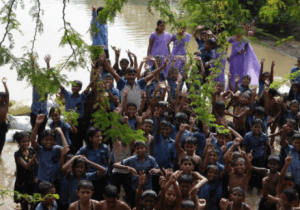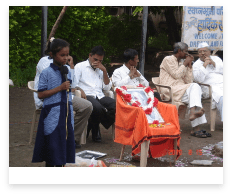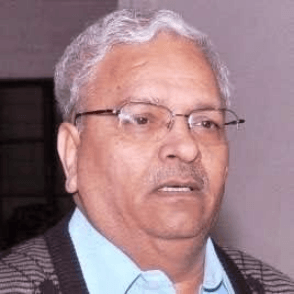

OVERVIEW
 Socio Economic Development Trust – SEDT is a registered NGO established in 1980 with an aim to make difference in the life of people in rural area of Parbhani district of Marathwada region of Maharashtra state.
Socio Economic Development Trust – SEDT is a registered NGO established in 1980 with an aim to make difference in the life of people in rural area of Parbhani district of Marathwada region of Maharashtra state.
It all started with a dream to provide a safe and secure shelter for destitute children. Swapnabhoomi is the dream which came true where we live with the children at Kerwadi. SEDT then enhanced its scope and build bridges for socio-economic development of the region. It is committed to work for poor and marginalized communities and trying to make a difference in their
lives.
At SEDT, we channelize our energies to make difference in the life of the people who need it most.
The development initiatives focus primarily to build dynamic and vibrant community structures and empower children, women and the society at large for socio-economic development.
SEDT is one of such catalyst that works towards the needs of development for rural areas
while helping corporate in investing in social initiatives.
vision

"Socio-Economic Development of the poor and weaker section of the society, where social
justice prevails and wherein people are mobilized for their own empowerment"
mission

With a mission to serve the weaker sections of the society we aim to create a community of empowered people who can manage their development process. Our organization symbolizes the primary care given to our environment with love, respect and equality towards others and our commitment to sustainable development and democracy.
why our intervention is needed?
 SEDT is a Civil Society Organization that builds the capacities of poor and marginalized communities, prioritizing women and children to support them in the areas of Education, Health, Resource Conservation, and Livelihood. For the last 30 years, we have worked in the Parbhani District ( in Gangakhed & Palam blocks ) to improve people’s lives. A significant part of the community lives in poverty, of which 40% are under BPL. Most women under the age of 30 are illiterate. Their social devaluation, which is very disturbing, accompanied their marginalization in the economic sector. A systematic bias is evident against women regarding their access to essential resources such as education, health, and nutrition. We find no priority given to girls’ education,
We believe in people’s inherent social and cultural strengths and potential to bring about a change for the development and betterment of life and society. And so the pannier of our Developmental Agenda includes the Conscious raising and Capacity Building of Women and Rescuing, Rehabilitating, and Reintegrating of Children from Child Labour. Targeted intervention and HIV prevention programs for Migrant labor and Commercial Sex Workers. Our paragon activity is “Dream Land,” an integrative Child Care Centre established at Kerwadi to provide care and support to the destitute and defector children and prepare them to face the outside world with dignity and self-confidence.
SEDT is a Civil Society Organization that builds the capacities of poor and marginalized communities, prioritizing women and children to support them in the areas of Education, Health, Resource Conservation, and Livelihood. For the last 30 years, we have worked in the Parbhani District ( in Gangakhed & Palam blocks ) to improve people’s lives. A significant part of the community lives in poverty, of which 40% are under BPL. Most women under the age of 30 are illiterate. Their social devaluation, which is very disturbing, accompanied their marginalization in the economic sector. A systematic bias is evident against women regarding their access to essential resources such as education, health, and nutrition. We find no priority given to girls’ education,
We believe in people’s inherent social and cultural strengths and potential to bring about a change for the development and betterment of life and society. And so the pannier of our Developmental Agenda includes the Conscious raising and Capacity Building of Women and Rescuing, Rehabilitating, and Reintegrating of Children from Child Labour. Targeted intervention and HIV prevention programs for Migrant labor and Commercial Sex Workers. Our paragon activity is “Dream Land,” an integrative Child Care Centre established at Kerwadi to provide care and support to the destitute and defector children and prepare them to face the outside world with dignity and self-confidence. 


Key achievements
Fie Foundation Award
Kamtekar Award
Best Practices Award
Dr. Mohan Bhalerao Mata Balsangopan Award
Krutadnyata Puraskar
1992
2000
2014
2018
2018
FOUNDER

Mr. Suryakant Kulkarni
During extensive research on the under-privileged areas of Maharashtra, SEDT led to concentrate on the Kerwadi village in Parbhani District. At the time of this experience, we noticed that the community we came across lacked the necessities of life and education. Also, there is a vast difference between observing fast and willingly remaining hungry due to the lack of food. We couldn’t turn a blind eye to the circumstances this part of the society was living in. And so, a notion kept us thinking about what measures we could take to help this underprivileged section of our community lead a better life.
We were confident of our goal – to contribute to the upbringing of homeless children, provide the homeless a haven, and help them live a life with opportunities to build their dreams. There are destitute children all over the world; it is a problem that is evident in developing and under-developed societies. Like most developing countries, India faces this same problem and many more connected issues like child labor, girl-child trafficking, malnourishment, and much more.
